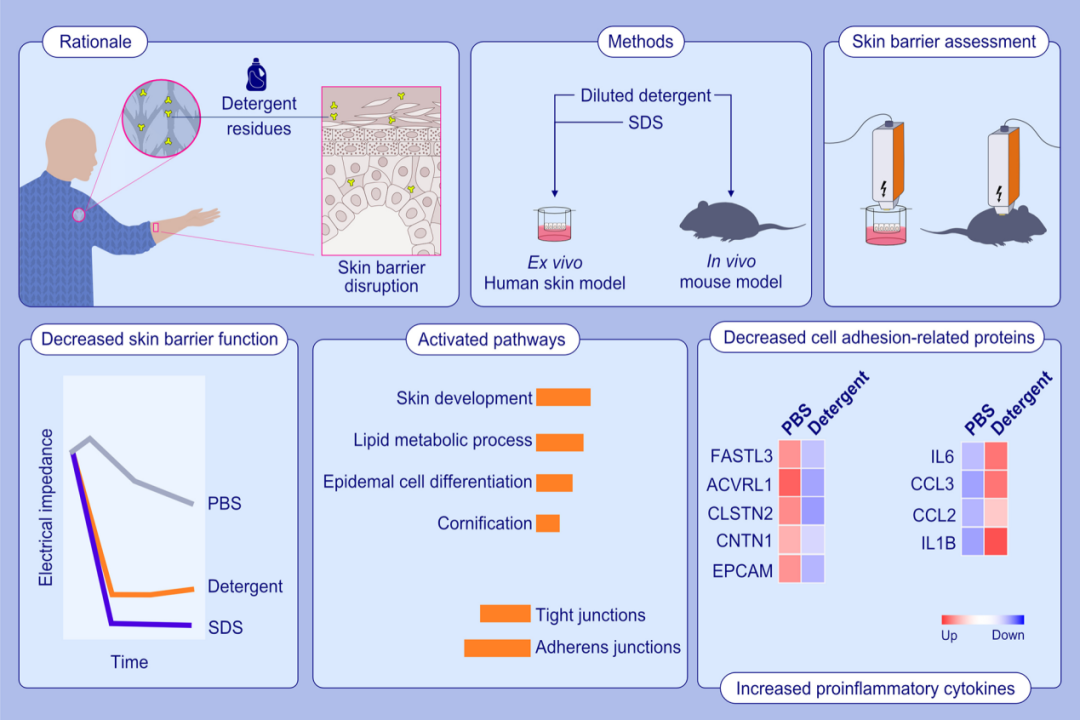Release date:2023-10-30

Allergy
DOI: 10.1111/all.15891
Abstract:
Background:Epithelial barrier impairment is associated with many skin and mucosal inflammatory disorders. Laundry detergents have been demonstrated to affect epithelial barrier function in vitro using air–liquid interface cultures of human epithelial cells.
Methods:Back skin of C57BL/6 mice was treated with two household laundry detergents at several dilutions. Barrier function was assessed by electric impedance spectroscopy (EIS) and transepidermal water loss (TEWL) measurements after the 4 h of treatments with detergents. RNA sequencing (RNA-seq) and targeted multiplex proteomics analyses in skin biopsy samples were performed. The 6-h treatment effect of laundry detergent and sodium dodecyl sulfate (SDS) was investigated on ex vivo human skin.
Results:Detergent-treated skin showed a significant EIS reduction and TEWL increase compared to untreated skin, with a relatively higher sensitivity and dose–response in EIS. The RNA-seq showed the reduction of the expression of several genes essential for skin barrier integrity, such as tight junctions and adherens junction proteins. In contrast, keratinization, lipid metabolic processes, and epidermal cell differentiation were upregulated. Proteomics analysis showed that the detergents treatment generally downregulated cell adhesion-related proteins, such as epithelial cell adhesion molecule and contactin-1, and upregulated proinflammatory proteins, such as interleukin 6 and interleukin 1 beta. Both detergent and SDS led to a significant decrease in EIS values in the ex vivo human skin model.
Conclusion:The present study demonstrated that laundry detergents and its main component, SDS impaired the epidermal barrier in vivo and ex vivo human skin. Daily detergent exposure may cause skin barrier disruption and may contribute to the development of atopic diseases.
First Author:
Arturo O. Rinaldi
Corresponding author:
Yasutaka Mitamura
Correspondence: Swiss Institute of Allergy and Asthma Research (SIAF), University of Zurich, Herman-Burchard Strasse 9, CH-7265 Davos, Wolfgang, Switzerland.
Email: yasutaka.mitamura@siaf.uzh.ch
[IF: 14.71]
Household laundry detergents disrupt barrier integrity and induce inflammation in mouse and human skinDOI: 10.1111/all.15891
Abstract:
Background:Epithelial barrier impairment is associated with many skin and mucosal inflammatory disorders. Laundry detergents have been demonstrated to affect epithelial barrier function in vitro using air–liquid interface cultures of human epithelial cells.
Methods:Back skin of C57BL/6 mice was treated with two household laundry detergents at several dilutions. Barrier function was assessed by electric impedance spectroscopy (EIS) and transepidermal water loss (TEWL) measurements after the 4 h of treatments with detergents. RNA sequencing (RNA-seq) and targeted multiplex proteomics analyses in skin biopsy samples were performed. The 6-h treatment effect of laundry detergent and sodium dodecyl sulfate (SDS) was investigated on ex vivo human skin.
Results:Detergent-treated skin showed a significant EIS reduction and TEWL increase compared to untreated skin, with a relatively higher sensitivity and dose–response in EIS. The RNA-seq showed the reduction of the expression of several genes essential for skin barrier integrity, such as tight junctions and adherens junction proteins. In contrast, keratinization, lipid metabolic processes, and epidermal cell differentiation were upregulated. Proteomics analysis showed that the detergents treatment generally downregulated cell adhesion-related proteins, such as epithelial cell adhesion molecule and contactin-1, and upregulated proinflammatory proteins, such as interleukin 6 and interleukin 1 beta. Both detergent and SDS led to a significant decrease in EIS values in the ex vivo human skin model.
Conclusion:The present study demonstrated that laundry detergents and its main component, SDS impaired the epidermal barrier in vivo and ex vivo human skin. Daily detergent exposure may cause skin barrier disruption and may contribute to the development of atopic diseases.
First Author:
Arturo O. Rinaldi
Corresponding author:
Yasutaka Mitamura
Correspondence: Swiss Institute of Allergy and Asthma Research (SIAF), University of Zurich, Herman-Burchard Strasse 9, CH-7265 Davos, Wolfgang, Switzerland.
Email: yasutaka.mitamura@siaf.uzh.ch
MK手机投注 | 安博·体育(中国)有限公司-官网 | 乐动官方网站 | 星空手机版 | 星空手机版 | mk体育(MKsports集团)股份公司 | 安博手机网页版登录入口 | 华体平台 | 千亿体育官网在线登录入口中国有限公司 |
 华亿体育(中国)游戏平台
华亿体育(中国)游戏平台
